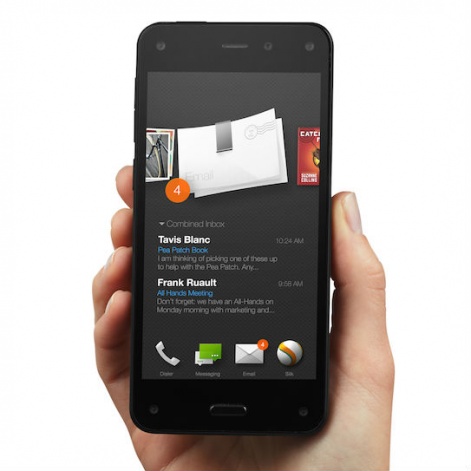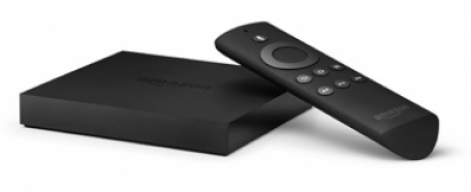There are plenty of reasons to think that Amazon could be a sleeping giant in the mobile gaming market. Not only does it have its Android fork, complete with the Amazon Appstore, and the popular Kindle Fire tablets, but it's now starting to extend its tendrils even further.
There's the Fire TV, a capable gaming device, some key acquisitions made for Amazon Game Studios, and of course, the new Fire Phone. Given the rise of mobile gaming, and the fact that Amazon has its Appstore on all three form factors, it's time to consider it a major player in gaming, right?
Well, not exactly. While some might think that Amazon was a sleeping giant that's finally ready to take on the world, they'd be wrong.
Amazon is still a sleeping giant, and until it proves it's willing to take gaming seriously, developers should look the other way.
Sell yourself
It all starts with the Fire Phone, which has some interesting hardware. The 3D screen and the Firefly technology make it an interesting device, as does the fact that it's an Amazon phone, because, well, Amazon does a great job at selling things.
Until Amazon proves it takes games seriously, devs should look the other way.
The problem is, Amazon had a big chance with the Fire Phone to change the way that handsets are distributed in the US.
Google had sold unlocked phones, sure, but Google Play's devices section pales in comparison to Amazon's in terms of e-commerce power.
Look at the site right now: Kindle devices are all over it. Amazon can be very pushy, and if it sold this phone at a price where people considering purchasing it would possibly jump in with Amazon, say at the $200-$300 range, the device's curiosity factor could have seduced more buyers.

Amazon could have also sold it for a reduced price as a way of bringing more people into the Amazon fold: it would have been a worthwhile move just to get more Firefly-toting devices out there, bringing back more information to Amazon HQ.
Instead, only AT&T customers can buy the phone, and at a $200 price point. That's the same price as the iPhone 5S and Galaxy S5, so it feels like a rough deal in comparison. On top of that, I don't think that 3D is going to push someone to buy a phone: it didn't in 2010, so it almost certainly won't in 2014.
The US phone market is a labyrinth to break in to, and with CDMA networks that don't make changing phones as simple as swapping out a SIM card, combined with 2-year contracts that are, quite frankly, all over the place, I doubt that taking Apple's strategy for entering the mobile market from 2007 and using it in 2014 was such a good idea.
Missing a trick
Similarly, the Fire TV feels like a missed opportunity because of the lack of a controller. Developers have said that it's a capable gaming device, but it's one where owners have to buy a $40 controller on top of the $100 system, and that puts a major damper on the situation.
Fire TV feels like a missed opportunity because of the lack of a controller.
There's a reason why every other console in history comes with a controller, and the thing that really scares me is that Amazon had the opportunity to do something big here, but, once again, it missed the boat.
Amazon needs to pack the controller in with the system, justify any losses by hooking drawing more people into the Amazon ecosystem with books, music, movies, apps, and games, and, eventually, convince people to buy its Amazon phone instead of a Samsung or Apple device.
At the moment, Amazon is only succeding in making its hardware range a curiosity, and that won't end well.

Ultimately, why I'm concerned about Amazon having more bark than bite is that it's in the company's nature to extend its reach, and to experiment with things in the name of remaining relevant.
Games could easily be like drones to Amazon: an interesting idea worth exploring, but not something serious, and I fear that by not taking bold steps from the outset Amazon has irredeemably screwed up its chances of having a major impact on the mobile gaming market.
Of course, Amazon still has extreme potential. It's too big, too powerful, and too inovative to be dismissed completely, and Amazon Game Studios could eventually release games that will become system-sellers.
Maybe the Fire phone will exceed my expectations, maybe more people will buy controllers for the Fire TV than I expect, and maybe developers will get in on the Fire TV and Fire phone because they want to take risks on new platforms and stores. It's possible, but in reality, it just isn't probable.
Unforutnately, I don't think that Amazon is putting itself in a position where it can be a legitimate part of gaming's future, and developers shouldn't latch on to Amazon's new platforms until it proves that it's looking to go more than simply dip its feet in the gaming waters.
Developers need commitment, developers deserve commitmment, and at the moment, Amazon simply can't offer that.
Formally of 148Apps, which was acquired by Pocket Gamer owner Steel Media in 2012, Carter Dotson is a freelancer writer working for Touch Arcade and Android Rundown.





















